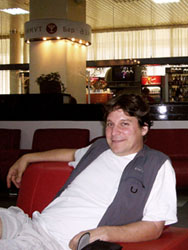Aktuelle Forschungsprojekte
Austrian Center of Limnology (ACL) - PhD position
This is one of two PhD positions, originally conceived as part of a planned inter-University PhD network, that was ultimately not funded in its original form by the Austrian Government. In its present form, two 3-year PhD positions, both with international cooperation are being funded by the Karl-Franzens University Graz. This position under my supervision has begun to apply so-called Next-Generation-Sequencing (NGS) applications to phylogeographic and phylogenetic anlaysis of salmonid fishes with an emphasis on the genus Salmo. The project is being carried out in close cooperation with Ulrich Schliewen of the Department of Ichthyology of the Bavarian State Collection of Zoology in Munich.
Interreg IV Italien-Österreich Projekt "AlpÄsch" (6142) CUP H21J12000040007 - Subauftrag: Genotypisierung, nachhaltige Sicherung und Bewirtschaftung regionaler Äschenbestände in anthropogen veränderten Gewässersystemen (AlpÄsch).
This Project is a subcontract from the Agricultural Research Center of the South Tyrolean Provincial Government. INTERREG projects are financed by the European Regional Development Fund, aimed at sharing knoweldege and transferring experience to improve regional policy. Our subcontract involves the genetic typing of European grayling Thymallus thymallus populations in Tyrolean and South Tyrolean rivers, with the aim of assisting in the development of a sustainable management and conservation plan for this recreationally and ecologically valuable fish species. In addition to typing and classifying wild populations, hatchery populations will also be screened and evaluated for their potential in contributing to a science-based management policy. In addition to the primary project leader in Laimburg, additional partners in the project include the Tyrolean Fisheries Organization, the Institute for Hydrobiology and River Management (BOKU) in Vienna, and the Provincial Government of Belluno .
Genetic Alterations in Captivity: The dynamics of adaptive, mal-adaptive and neutral genetic variation in captured and cultured animals (with Tamara Schenekar, Anne Schmidt-Küntzel, Laurie Marker and Steven Weiss)(PhD grant from the Austrian Academy of Sciences)
This Project investigates how genetic drift and natural selection shape the genetic composition of a population - a fundamental question in evolutionary biology that is of significant importance for the management of captive popoulations. Genetic drift becomes a more dominant force in populations with small effective population sizes. Captive populations often have small effective population sizes due to founder effects during their establishment or low numbers of individuals in general compared to their wild counterparts. Additionally, increasing attention has been given to selection in captivity; captive environments provide a drastically different selection regime than natural habitats and thus could lead to the selection of traits that are maladaptive in the wild. Both genetic drift and altered selection pressure can lead to reduced fitness of the captive population, but the management strategies to reduce the effects of those two forces are in conflict. Thus, we urgently need a better understanding of the intensity of genetic drift and selection in captive populations. The study species are brown trout (Salmo trutta), cheetah(Acinonyx jubatus), and two cichlids (Cyprichromis coloratus and Tropheus moorii). The relative impact of genetic drift will be evaluated through the alteration or loss of genetic variability at neutral versus adaptive genetic markers. Neutral markers will include the whole mtDNA control region and 15-20 microsatellite loci per species. Adaptive markers will be represented by exonic regions of the Major Histocompatibility Complex (MHC) II and three to four Cytochrome P450s (CYPs).






Genetic characterization of French grayling (in cooperation with Henri Persat - University of Lyon - and financed by the Federal Anglers Association)
Genetic Typing of Carinthian brown trout
This ongoing contract work, now in its 10th year, contributes to the identification of native populations of brown trout in the Austrian province of Carinthia. The work is primarily funded by the Nature Protection Agency of Carinthia, and promoted by the relentless efforts of Klaus Kugi. Additional support has come from the National Park Hohe Tauern. These efforts are not limited to genetic identification, but seek to protect these populations and promote scientific based management activities.
Assoz. Univ.-Prof.Dr. Steven Weiss

